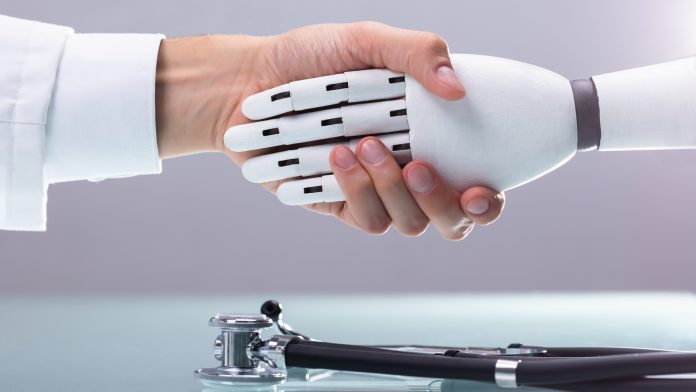
Robots and humans are set to compete against each other in a new NHS trial to determine if robot-assisted hip replacement surgery can one day replace conventional treatment.
The RACER-Hip Study will evaluate the performance of robots against their human counterparts at hip replacement surgery, analysing patient outcomes. Hip replacement surgery is one of the most prevalent procedures in the NHS, meaning robot-assisted surgery, if safe and effective, could reduce the health system’s workload.
How does robot-assisted hip replacement surgery work?
Robot-assisted surgery has become increasingly prominent in recent years, most notably in the US. The NHS is now exploring the benefits of robotic systems, but there is currently little evidence that they are more effective than conventional surgery.
In robot-assisted hip replacement surgery, a robotic arm prepares the bone and inserts the components into a pre-programmed three-dimensional plan. Experts believe that robots can enhance surgical precision, reduce treatment variation, and prevent poor outcomes and complications that require more surgery.
The RACER-Hip Study
The RACER-Hip Study received £1 million in funding from the National Institute for Health and Care Research (NIHR). It will be run by experts from Warwick Medical School at the University of Warwick, University Hospitals Coventry and Warwickshire (UHCW) NHS Trust, and the Royal Orthopaedic Hospital (ROH) in Birmingham.
The project will be spearheaded by Peter Wall from the Royal Orthopaedic Hospital Birmingham and Warwick Clinical Trials Unit at the University of Warwick, and Professor Ed Davis, from the Royal Orthopaedic Hospital Birmingham.
Wall said: “The RACER-Hip study is a significant investment by the NHS to examine the effectiveness of robotic hip replacement surgery.
“Robotic technology has the potential to revolutionise hip replacement surgery. However, the first step to this is understanding whether it can help enhance the care surgeons provide.
“We are really excited that some centres such as Northumbria Healthcare NHS Foundation Trust have been provided with a robot specifically to take part in this research.”
Professor Davis added: “The research will help orthopaedic surgeons across the world to better understand the most effective tools for performing hip replacement surgery and ensure the very best outcomes for their patients.
“This study will also include an in-depth health economic analysis to inform the NHS if this technology should be widely adopted.”
The trial will see an equal number of patients randomised into a robot-assisted and human surgery group to evaluate outcomes. Patients will be asked questions about their ability to complete tasks after surgery and their long-term quality of life.
Patients will be invited from at least six NHS hospitals in England and Scotland in the next few months to participate in the trial. Stryker will manufacture the robots and support the study costs so that hospitals do not have to pay to take part.
The RACER studies are part of a substantial £3m investment from the NHS into robotic-assisted surgery as the UK looks to become a global leader in robotics in healthcare.
























